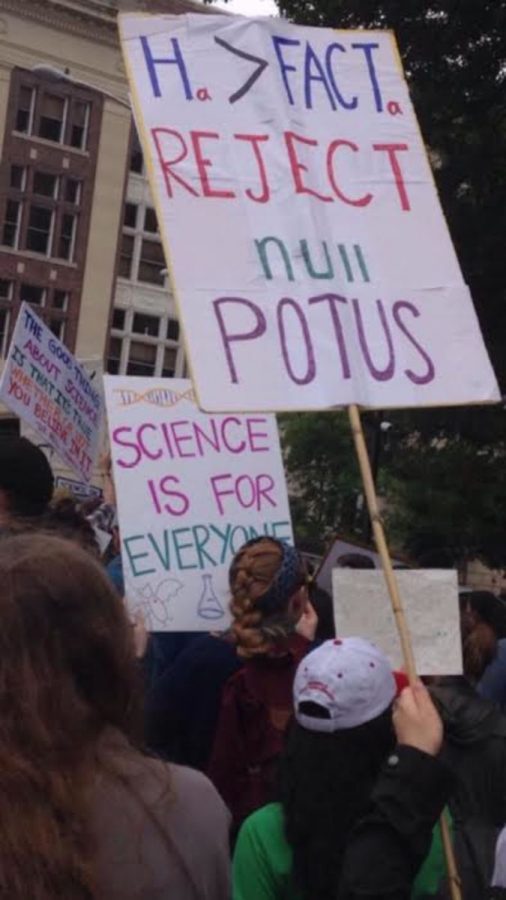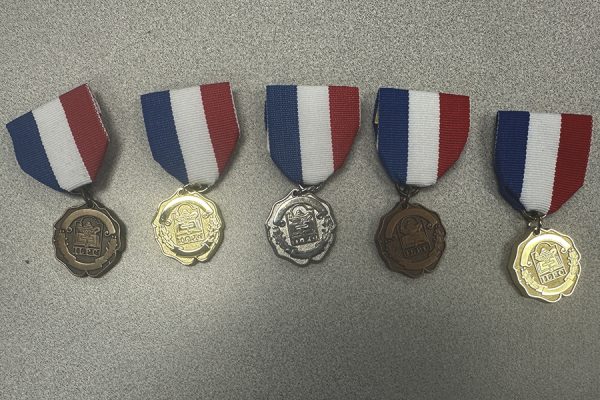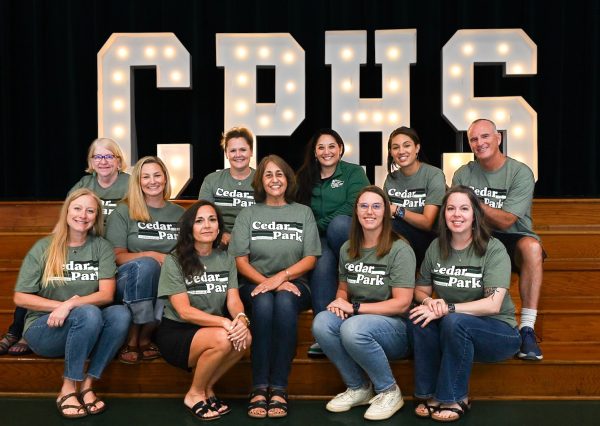CPHS Students March for Science
courtesy of senior Deena Ismail
CPHS student’s participated in the Science Fair march, and senior Deena Ismail took pictures of different signs and slogans that made her laugh.
May 10, 2017
Scientists, teachers, students, engineers and more stormed the Austin capitol on April 22 to create conversation and change in regard to the current administration’s stance on science. The administration has employed many changes to our government’s distribution of information, while expunging some Obama era environmental polices. Some of the changes include the defunding of many STEM [science, technology, engineering and medicine] programs, changes to the “Clean Power Plan” and proposed budget cuts to the E.P.A.
Marches like this one have been a monthly occurrence for 2017, as people from all across the state participate in exercising their right to protest. In an effort to protest disagreeable opinions and polices, each month has warranted a march, such as [in order of month]: The Women’s March, Black Lives Matter and Martin Luther King Jr. memorial, “No Ban No Wall” and The March for Science.
A handful of CPHS students have been avid participants in all of the marches, and for the March for Science, some honor societies, like Science National Honor Society, gave hours for attending the march.
While hours weren’t her main goal, senior Deena Ismail marched with other members from SNHS.
“My favorite part about the march was seeing everyone’s signs,” Ismail said. “There were a lot of funny puns, and there was even this guy dressed as Abraham Lincoln holding a sign that said, “Trump is Evil.” But my favorite sign was definitely this one made a joke about the null hypothesis and it said to reject the null POTUS.”
While some, like Ismail, participate in marches because they truly believe in helping, others went because of the need for hours, like junior Ricki Rosario.
“I participated in the Science March because I saw it as a fun way to get the hours I needed for Rho Kappa,” Rosario said. “Being one of the kids who joined the march mostly because of the hours, I think that most of us [that went because of the need for hours], didn’t know what to expect but once we started participating and getting into it, we all had a great time.”
Though his initial reason may have been because of hours, his ideas coincided with the thoughts of the march.
“Science is what advances us further as a society,” Rosario said. “Marches like these are important because they spread awareness on that fact. Governments should not be allowed to withhold scientific information from the public. Everyone has the right to know the facts.”
Advancement in society is one of one of the main reasons that junior Mina Kim thinks that science is important and a part of the reason she marched.
“I think science is important because it’s something unique to humans, something representative of our innate curiosity of the world and beyond,” Kim said. “It’s honestly inspiring, the way we cannot just turn mere things into known objects, but also use our knowledge to benefit ourselves and others.”
Like Rosario, this was Kim’s first march and her thoughts mimicked those of Rosario.
“It opened my eyes to the power of the people,” Kim said. “Everyone was marching for a singular purpose and it was great to be a part of it and be with like-minded people.”
Spreading awareness is a large reason why marches like these happen, however sometimes the benefit of marches is called in to question, as well as the ability of a single person to enact change.
“I think that change begins with an individual and that everyone has the potential to be a positive impact if they choose to be,” Ismail said. “I don’t know if the march caused any big changes, but it definitely brought more attention to the issue and showed that a lot of individuals care enough to be that positive impact.”

![Posing with their UIL State Trophy, the Robolobos Van Halen Team beams with excitement after their win. “It was a team effort,” junior Noah Vo said. “I was happy because something happened in the first match and the match was also really close. So [when] they finally revealed it, I was pretty happy.” Photo courtesy of Amy Lovelace](https://cphswolfpack.com/wp-content/uploads/2025/05/IMG_0910-EDIT-1200x723.jpg)

![Broadcast, yearbook and newspaper combined for 66 Interscholastic League Press Conference awards this year. Yearbook won 43, newspaper won 14 and broadcast took home nine. “I think [the ILPC awards] are a great way to give the kids some acknowledgement for all of their hard work,” newspaper and yearbook adviser Paige Hert said. “They typically spend the year covering everyone else’s big moments, so it’s really cool for them to be celebrated so many times and in so many different ways.”](https://cphswolfpack.com/wp-content/uploads/2025/05/edited-ILPC.jpg)













![Bringing her arm over her head and taking a quick breath, junior Lauren Lucas swims the final laps of the 500 freestyle at the regionals swimming competition on date. Lucas broke the school’s 18-year-old record for the 500 freestyle at regionals and again at state with a time of 4:58.63. “I’d had my eye on that 500 record since my freshman year, so I was really excited to see if I could get it at regionals or districts,” Lucas said. “ State is always a really fun experience and medaling for the first time was really great. It was a very very tight race, [so] I was a bit surprised [that I medaled]. [There were] a lot of fast girls at the meet in general, [and] it was like a dogfight back and forth, back and forth.” Photo by Kaydence Wilkinson](https://cphswolfpack.com/wp-content/uploads/2025/03/Kaydence-2.7-23-edit-2.jpg)
![As the support team sits and poses for a photo in the cafeteria with the counseling team they eagerly wait to start their day. "We [all] seem to be a team, I get up every day and there's days where I don't want to go to work today, but I'm thankful that I have a job and I'm blessed to have what I have," Christopherson said. Photo Courtesy of Julie Weltens.](https://cphswolfpack.com/wp-content/uploads/2025/01/AF9E8470-10D7-4C91-BF28-EC8F86BAB66C-1200x852.jpeg)
![Officer Stephanie Cash is in her second year as an SRO at CPHS. “Seeing [students] grow over the years has been kind of cool,” Officer Cash said. “Freshmen that [are] all over the place and then in the next couple of years get a little more squared away and go to class and do work and start thinking about the future. Being a part of a student's growth is the best way to measure my success as an SRO.” Photo Courtesy of Cedar Park Police Department's PIO, Alicia Gallagher.](https://cphswolfpack.com/wp-content/uploads/2024/12/CPHS-SRO-900x1200.jpg)



![Taking a breath as he raises his arm up and out of the water, sophomore Kaden Padilla swims the 500 freestyle at the UIL state meet on Feb. 21-22. Padilla placed 10th overall and second in the consolation final in the event, dropping two seconds. “My family was there, so being able to drop time for them was really special,” Padilla said. “It was awesome [finding out I advanced to the consolation finals]. I wasn’t expecting it, and I was very surprised. My parents being there definitely made me a lot happier knowing they got to see me swim in finals.” Photo by Skyler King.](https://cphswolfpack.com/wp-content/uploads/2025/03/kaden-padilla.jpg)

![Three defenders try to stop senior point guard Hope Edwards before the ball leaves her hands. The girls basketball team faced Liberty Hill on Feb 21, losing 58-40. “[My season was] definitely bittersweet,” Edwards said. It's definitely sad [because] I'm gonna miss all my teammates, my coaches and just the whole CP environment.”](https://cphswolfpack.com/wp-content/uploads/2025/03/julia-128-1200x800.jpg)



























![Whereas classical art depicts a scene and tells a story, often of mythology or religious references, artists of modern times focus more on expressing ideas and feelings. The style of back then has since been replaced by splashes of color, curvy lines and other new art techniques. "[Over time] I think art has shifted more to emotion rather than human beauty, " sophomore Braeden Murray said. "Modern art is significantly more abstract and doesn't have an obvious theme in mind. Very simple shapes, no people to be seen, and more colorful. I think in the older [time period] the art was definitely more human based, with biblical [references] while modern art is more emotion based because it's not depicting a particular scene or action that's happening.”](https://cphswolfpack.com/wp-content/uploads/2023/02/2023-vs-1503-300x200.png)




